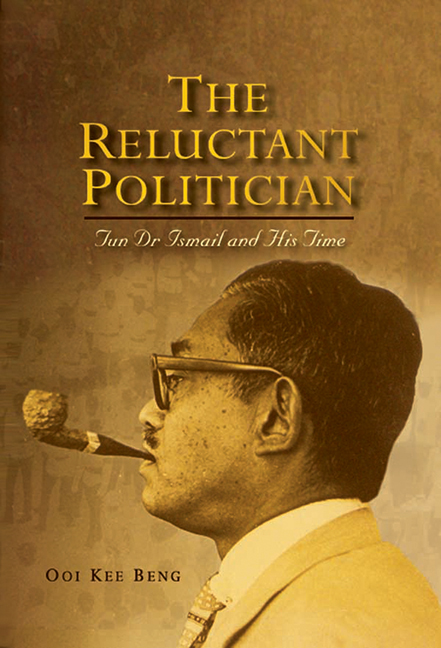Book contents
- Frontmatter
- Contents
- Foreword
- MESSAGE FROM THE DIRECTOR
- PREFACE
- Acknowledgements
- About the Author
- Chronology
- PART ONE Merdeka or Medicine?
- PART TWO Remaking Malaysia
- Chapter Six Forced from Retirement
- Chapter Seven A Lack of Time
- Chapter Eight Nailing Things into Place
- List of Abbreviations
- Bibliography
- Index
- Photographs
Chapter Seven - A Lack of Time
from PART TWO - Remaking Malaysia
Published online by Cambridge University Press: 21 October 2015
- Frontmatter
- Contents
- Foreword
- MESSAGE FROM THE DIRECTOR
- PREFACE
- Acknowledgements
- About the Author
- Chronology
- PART ONE Merdeka or Medicine?
- PART TWO Remaking Malaysia
- Chapter Six Forced from Retirement
- Chapter Seven A Lack of Time
- Chapter Eight Nailing Things into Place
- List of Abbreviations
- Bibliography
- Index
- Photographs
Summary
Razak announced the formation of the National Consultative Council (NCC) in January 1970, with himself as the chairman. Its function was to involve representatives of various social groups — “political parties, the professions, religious groups, the press, the public services, trade union and minority groups” — in discussing the riots and “finding permanent solutions to our racial problems” (ST 13 January 1970). Where the NOC was the de facto government, the NCC — six of whose members were also with the NOC — was to function as the country's “parliament”. The DAP, however, declined representation after a request that their detained secretary-general Lim Kit Siang be accepted as a member was rejected (Milne and Mauzy 1978, p. 90).
The NCC started with a membership of sixty-three men, but after complaints about the complete lack of women membership in it, lawyer P.G. Lim of the Labour Party, who later became ambassador to the United States and also to Yugoslavia, and Aishah Ghani, who was later head of UMNO Wanita, were included, swelling the NCC to sixty-five members (Lim 2005, pp. 113–14). It was within this body — freed from observers and pressmen — that consensus on various issues was sought. Questions such as the removal of “sensitive issues” from public debate, the careful formulation of the Rukunegara — Articles of Faith of the State — and the construction of the New Economic Policy were cogently discussed within the NCC. However, only summaries of the proceedings were ever recorded. These are still classified as top secret documents.
Sometime at the end of 1969, Razak and Ismail — and three medical personnel who were subsequently sworn to secrecy — learned that Razak, the de facto prime minister, was suffering from leukaemia. Ismail took the Kuok brothers into his confidence. Robert Kuok recalls: “Doc told me that Razak was dying already in early 1970, when I was often in Kuala Lumpur. Sometime after Doc passed away, my brother Philip confided in me that Razak was critically ill, which I already knew” (Interview 10 February 2006).
- Type
- Chapter
- Information
- The Reluctant PoliticianTun Dr Ismail and His Time, pp. 219 - 240Publisher: ISEAS–Yusof Ishak InstitutePrint publication year: 2007

